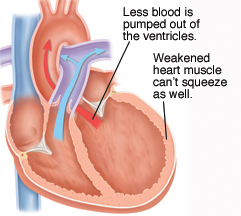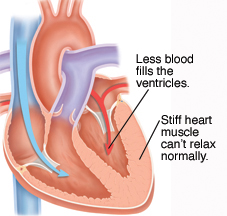What is Heart Failure?
The heart is a muscle that pumps oxygen-rich blood to all parts of the body. When you have heart failure, the heart is not able to pump as well as it should. Blood and fluid may back up into the lungs, and some parts of the body don’t get enough oxygen-rich blood to work normally. These problems lead to the symptoms you feel.
When you have heart failure
With heart failure, not enough oxygen-rich blood leaves the heart with each beat. There are 2 types of heart failure. Both affect the ventricles’ ability to pump blood. You may have 1 or both types.
Systolic heart failure. The heart muscle becomes weak and enlarged. It can’t pump enough oxygen-rich blood forward to the rest of the body when the ventricles contract. The measurement of how much blood your heart pushes out when it beats is called ejection fraction. In systolic heart failure, the ejection fraction is lower than normal. This can cause blood to back up into the lungs and cause shortness of breath and eventually ankle swelling (edema). This is also called heart failure with reduced ejection fraction, or HFrEF.
Diastolic heart failure. The heart muscle becomes stiff. It doesn’t relax normally between contractions, which keeps the ventricles from filling with blood. Ejection fraction is often in the normal range. This can still lead to the backup of blood into the body and affect the organs such as the liver. This is also called heart failure with preserved ejection fraction or HFpEF.
Recognizing heart failure symptoms
When you have heart failure, you need to pay close attention to your body and how you feel, every single day. That way, if a problem occurs, you can get help before it becomes too severe. You'll need to watch for changes in your symptoms. As long as symptoms stay about the same from one day to the next, your heart failure is stable. But if symptoms start to get worse, it's time to take action.
Signs and symptoms of worsening heart failure include:
-
Rapid weight gain
-
Shortness of breath
-
Swelling (edema)
-
Fatigue
How heart failure affects your body
When the heart doesn't pump enough blood, hormones (body chemicals) are sent to increase the amount of work the heart does. Some hormones make the heart grow larger. Others tell the heart to pump faster. As a result, the heart may pump more blood at first, but it can't keep up with the ongoing demands. So, the heart muscle becomes even more weak. Over time, even less blood is pumped through the heart. This leads to problems throughout the body as organs began to feel the effects of a long-term lack of oxygen. Eventually, if untreated, this can cause problems with your lungs, liver, kidneys, and loss of elasticity in the skin, and skin changes in the lower legs. A weak heart itself can eventually cause a severe decline in health and possible death if left untreated.
What is ejection fraction?
Ejection fraction (EF) measures how much blood the heart pumps out (ejects). This is measured to help diagnose heart failure. A healthy heart pumps at least half of the blood from the ventricles with each beat. This means a normal ejection fraction is around 50% to 70%. Your doctor will calculate ejection fraction from an echocardiogram.

